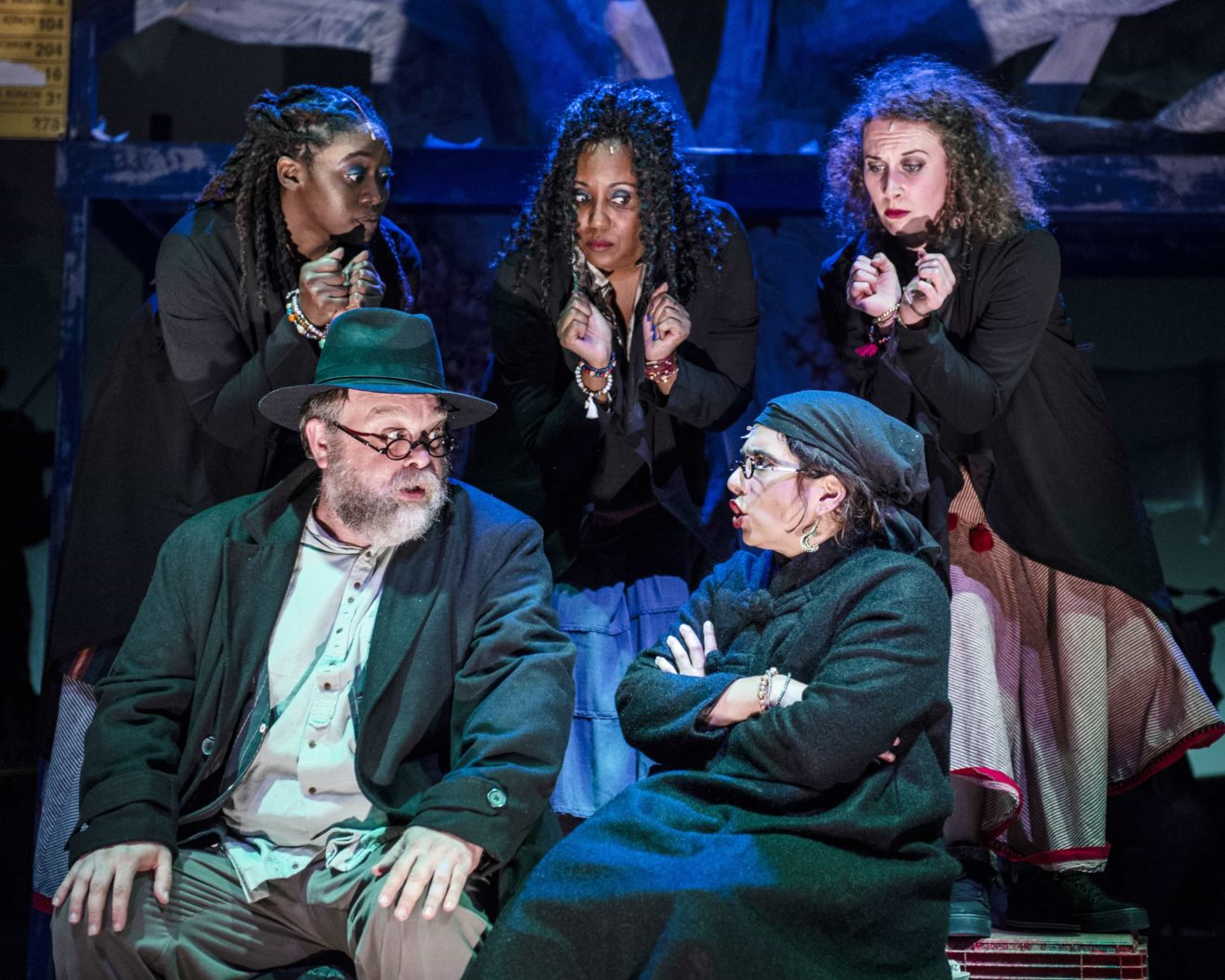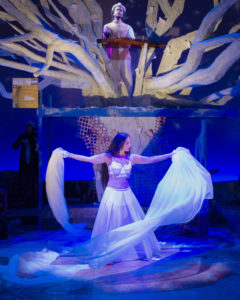Celebrating the lushness of love without shying away from the moody darkness that might befall lovers, Theater J opens its new season with the East Coast premiere of the musical Love Sick.

Love Sick is an earthy, visually sensual, musically delightful production based upon and freely adapted from the biblical and poetic Song of Songs. This new work is by playwright Ofra Daniel.
Previous knowledge of Song of Songs is not necessary to appreciate the fine layered production values of Theater J’s Love Sick. With sixteen musical numbers by Ofra Daniel and Lior Ben-Hur, Love Sick is ardently directed by Olivier and Tony Award nominee Christopher Renshaw.
Love Sick tells a story of a new wife named Tirzah (a vigorously spirited Ofra Daniel) in an arranged marriage of sorts. She is 30 years old. She is just married to a widower (Sasha Olinick) a fishmonger who is two decades her senior. He has two sons needing a mother, or so he and the community think. The setting is Jerusalem and Tel Aviv, “unbounded” by time. It could be then or maybe now.
Tirzah finds herself in a seemingly lifeless, physically passionless marriage to her husband (known only as The Husband, with no first name). He is hard-working, but shy, if not physically glacial and reserved around her. As they unsuccessfully try to have children, questions come up. What will Tirzah do? What will her husband do? Then Tirzah receives an unexpected letter. It is full of poetic passion for her. But who is the writer? How does he know her?

‘Love Sick.’ Photo by Teresa Castracane.
Music direction is by Ali Paris, noted in the Love Sick marketing material as a celebrated Palestinian musician who has toured with artists such as Alicia Keys and Quincy Jones. Paris also performs as a key character in the production.
The Women of Jerusalem (Sarah Corey, Sarah Laughland, Kara-Tameika Watkins and Kanysha Williams) fill the Theater J stage with “Poor Tirzah,” a bright “tsk tsk” number about the character Tirzah being a single woman. Another notable song is “Blessed is the Man” sung by The Husband and the Women of Jerusalem suggesting that it is Tirzah’s duty to submit to her husband.
“Dance for Me” is the song that begins Love Sick’s turn away from traditional cultural pageantry to a complex, contemporary outlook. It is a sensual poem sung by a man identified as The Lover (Ali Paris with a rich balladeer’s tenor). While he is unseen by Tirzah, she hears his passionate words. His voice awakens her into a euphoria that she thought was unimaginable. In response, she sings and dances and spins with utter passion to her new anthem “I Am I.” It is a song about wanting what one wants and seeking it out.
To go beyond this small taste of the show would be to ruin its complexity. But true love is not an easy journey. Love’s journey can have unforeseen consequences and surprising repercussions.
The Theater J production is terrifically served by the lively music under the direction of Paris. He also has sparkling skills with a rare Middle-Eastern instrument called a Qanun. It is a 76 string zither. Along with Paris, the live music is performed by a fiery band of musicians who are active participants in Love Sick. They are not hidden away. The band includes a Klezmer-like clarinet, animated percussion, soulful violin, and more.
Choreography by Matt Cole is striking for its exuberance with traditional dance forms and eye-widening with an image of a whirling dervish, spinning as if in a trance. The choreography is uncomplicated, based upon group circle dances, and fluidly performed with sheer joy. Ofra Daniel takes center stage with abandon in trance-like whirling solos. Her dances become a visually stunning statement; Tirzah is finding her own true self through dance. No longer an object for the male gaze as she find her own personal Heaven.
Kelsey Hunt’s costume design for the character Tirzah is one of multiple white layers. As the character Tirzah discovers herself and new layers are uncovered, her internal changes are seen through the flattering costumes she wears. Misha Kachman’s scenic design is a “Tree of Life” motif. The center stage is filled with a two level tree with spreading branches. There are all sorts of items about the stage floor including movable crates well used by the actors to stand on and present themselves. Lighting by Andrew R. Cissna is especially noteworthy in providing an eerie mien.
Love Sick does have script issues, unless it is aimed at a very specific audience or to particular venues. An example, when the music bursts forth, sometimes there are Hebrew lyrics. Authentic as it may be, if an audience does not speak Hebrew they will miss the nuances of meaning unless there are supertitles or the words are sung in English (or perhaps some hints in the program). If an audience is less familiar with the Yiddish concept of “meshuggah” which is used at a key moment, that can stop the show’s progression for that audience member. And more, will this gorgeous musical about a woman seeking love, passion, sensuality, and especially her own agency be overshadowed by its more visually alluring moments?
Love Sick is a lovely, bright-eyed leap from biblical poetry to freely giving and receiving love with a “heart that beats wild.” It is about love that knows no bounds. Its denouncement is one to discuss after the show.
Running time: 90 minutes with no intermission
Love Sick plays through September 29, 2019, at Theater J, The Trish Vradenburg Stage, Aaron & Cecile Goldman Theater, Morris Carfitz Center for the Arts, at the Washington DC Jewish Community Center, 1529 16th Street, NW, Washington, DC. For tickets, call the box office at (202) 777-3210, or purchase them online.
Musicians:
Percussion: Manny Arciniega, Kendell Haywood
Violin: Jason Labrador, John Tyler Garner
Qanun: Ali Paris
Guitar: Cristian Perez, Duff Davis
Bass: Benjamin Rikhoff
Woodwinds: Mila Weiss




